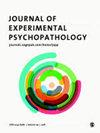Process-based therapy: A personalized approach to treatment
IF 1.9
4区 医学
Q4 PSYCHIATRY
引用次数: 3
Abstract
Historically, evidence-based treatment has followed the latent disease model, which emphasizes using specific protocols tied to diagnoses. Today, the field continues to move towards an individual approach with models of treatment based on change processes. Here, we describe Process-Based Therapy (PBT), a new way of thinking that is moving away from nomothetic studies of diagnosis-driven interventions toward an individual approach to treatment that recognizes the complexity of human suffering. In PBT, therapists select from a wide range of evidence-based interventions, tailoring treatment to meet a person’s needs at a given point in time. PBT is used to analyze intra-individual changes at the level of complex networks of biopsychosocial events, then gathering these into subpopulation and overall population parameters using theory and experimental analysis. PBT emphasizes tracking patient progress over time and treating symptoms based on current experiences, as well as understanding a patient’s past and predicting future experiences. Through specific analyses that aid in this process, therapists can use PBT to create a network with clients to visualize symptoms over time and areas of change.基于过程的治疗:一种个性化的治疗方法
从历史上看,循证治疗遵循潜伏性疾病模型,强调使用与诊断相关的特定方案。今天,该领域继续朝着基于变化过程的治疗模型的个人方法发展。在这里,我们描述了基于过程的治疗(PBT),这是一种新的思维方式,它正在从诊断驱动干预的单一性研究转向认识到人类痛苦复杂性的个体治疗方法。在PBT中,治疗师从广泛的基于证据的干预措施中进行选择,定制治疗以满足患者在特定时间点的需求。PBT用于分析生物心理社会事件复杂网络层面的个体内部变化,然后通过理论和实验分析将这些变化收集到亚种群和总体种群参数中。PBT强调随着时间的推移跟踪患者的进展,根据当前的经验治疗症状,以及了解患者的过去和预测未来的经历。通过在这一过程中提供帮助的具体分析,治疗师可以使用PBT与客户建立一个网络,以可视化随时间推移的症状和变化的领域。
本文章由计算机程序翻译,如有差异,请以英文原文为准。
求助全文
约1分钟内获得全文
求助全文
来源期刊

Journal of Experimental Psychopathology
Medicine-Psychiatry and Mental Health
CiteScore
2.00
自引率
0.00%
发文量
19
审稿时长
11 weeks
期刊介绍:
The Journal of Experimental Psychopathology (EPP) is an open access, peer reviewed, journal focused on publishing cutting-edge original contributions to scientific knowledge in the general area of psychopathology. Although there will be an emphasis on publishing research which has adopted an experimental approach to describing and understanding psychopathology, the journal will also welcome submissions that make significant contributions to knowledge using other empirical methods such as correlational designs, meta-analyses, epidemiological and prospective approaches, and single-case experiments.
 求助内容:
求助内容: 应助结果提醒方式:
应助结果提醒方式:


